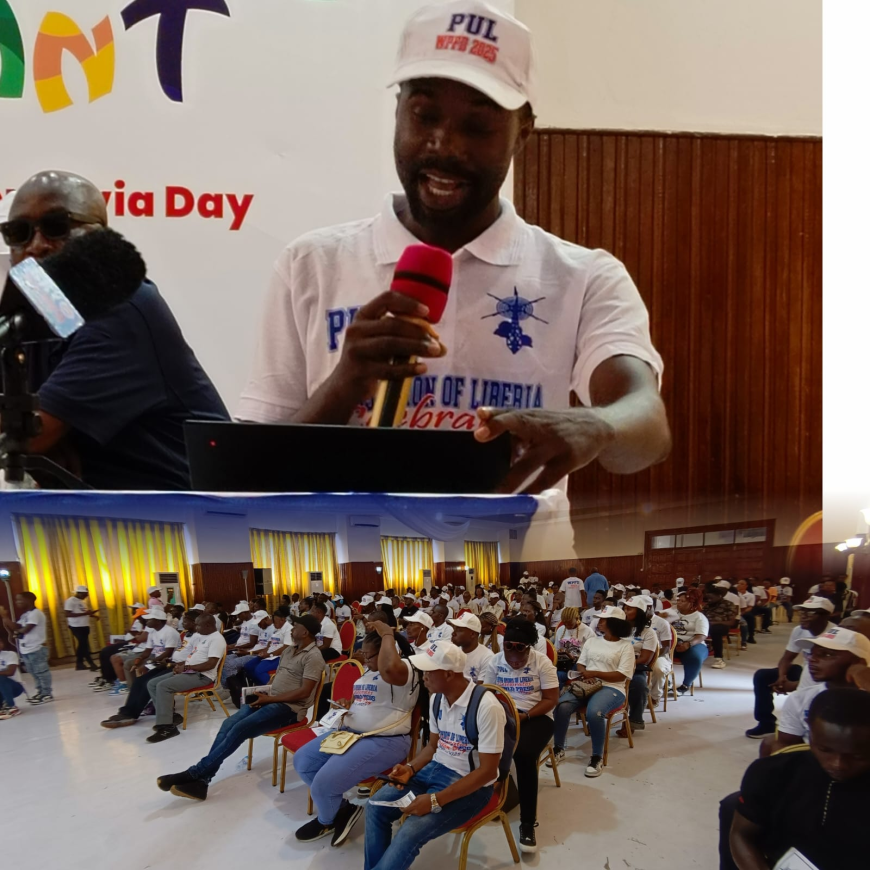PUL Demands Institutional Reform, Ethical Media Rebirth amid Escalating Threats to Independent Journalism

Monrovia, Liberia: In commemoration of the 2025 World Press Freedom Day celebration on Saturday, May 3, 2025, under the global theme “Reporting in the Brave New World—The Impact of Artificial Intelligence on Press Freedom and the Media,” the President of the Press Union of Liberia (PUL), Julius Kanubah, raised concerns about the worsening state of journalistic independence, structural decay within the Liberian media landscape, and the increasingly manipulative role of political interests embedded within newsrooms.
By: Abraham Sylvester Panto
Marking the celebration at the Monrovia City Hall under the local theme, “Sustaining Independent Journalism and Press Freedom in the Digital Age,” the Union focused on urgent domestic realities, which, according to President Kanubah, include the growing collapse of journalistic ethics, the infiltration of political financiers into newsroom management, and the unregulated expansion of social media platforms that are rapidly eroding professional news values.
“We must not overlook the risks confronting us, especially those embedded in Liberia’s increasingly politicized media ownership environment,” Kanubah cautioned on media ownership and ethical challenges.
Speaking against the normalization of partisan propaganda disguised as reporting, President Kanubah criticized both media institutions and individual journalists for allowing personal, political, and financial interests to overshadow public service journalism.
He stated that the future of Liberian democracy depends not only on constitutional guarantees but on a bold recommitment to accuracy, fairness, and institutional integrity in the daily practice of journalism.
Kanubah: “We know some institutions are owned by political actors with vested interests. But ultimately, it is the conduct of us, the professionals within these institutions, that will determine whether journalism in Liberia thrives or deteriorates."
However, he emphasized the necessity for tangible institutional backing, including regulatory oversight, media sector investment, and protective legislation for journalists, arguing that freedom of the press, in the absence of state-supported infrastructure and legal protection, becomes a hollow promise often violated without consequence.
President Kanubah pointed to the proliferation of “one-man, one-phone” media platforms, which, though democratizing in form, have given rise to a chaotic media environment where misinformation thrives, editorial standards collapse, and reputation-destroying falsehoods circulate with little to no accountability.
“Online journalism has introduced new voices and expanded access, but it has also led to misinformation, sensationalism, and weakened fact-checking,” the PUL President critiqued digital misinformation.
Highlighting the dangers of unchecked online publishing, the Union proposed partnerships with national regulatory bodies including the Liberia Telecommunications Authority and the Ministry of Posts and Telecommunications to introduce enforceable ethical standards and coordinated frameworks aimed at curbing misinformation without infringing on the rights of legitimate content creators.
President Kanubah acknowledged that press freedom cannot thrive in an environment where journalists remain structurally underpaid, professionally unsupported, and continuously exposed to political, physical, and legal intimidation, particularly when many media houses function without editorial policies, conflict-of-interest regulations, or transparent funding sources.
“Journalists are underpaid, media institutions are underfunded, and advertising revenues have sharply declined,” he intoned.
To address these deficiencies, President Kanubah called on President Joseph Nyuma Boakai and the Ministry of Information, Cultural Affairs, and Tourism (MICAT) to operationalize public commitments to a free press by restoring government-backed media development funds, offering tax incentives for private investment in journalism, and reestablishing the collapsed donor coordination mechanisms that previously supported independent reporting projects.
“If the state believes in democracy, it must invest in the press—not control it, but support it.”
The PUL boss reiterated its pledge to decentralize the Union operations across all fifteen counties, arguing that those working outside Monrovia remain essential to inclusive national discourse but continue to operate in isolation, often without institutional support, professional training, or basic security guarantees.
Confronting the reality of ethical compromise within the media, President Kanubah acknowledged the growing perception that journalism in Liberia is becoming indistinguishable from political messaging, warning that if the profession continues to tolerate editorial compromise, unverified reporting, and direct political sponsorship, it will lose its ability to function as a credible watchdog or democratic safeguard.
In response to the growing disenchantment among young journalists and students of mass communication, President Kanubah emphasized that journalism must be reclaimed not as a popularity contest or a stepping-stone to political appointments but as a principled public service requiring research, discipline, and the capacity to resist external pressure.
Condemning acts of violence, censorship, and harassment against journalists, he warned that any further targeting of media professionals, whether from political actors, state agents, or private citizens, would be publicly documented, legally pursued, and institutionally resisted through domestic and international advocacy.
“Attacks, harassment, and intimidation persist; this must stop. No government actor should stifle dissenting voices or infringe upon citizens’ rights to free expression,” President Kanubah warns.
He expressed concern over Liberia’s slipping down the slope of international press freedom ranking and emphasized that global indicators should not be interpreted as distant data points but as urgent policy feedback demanding reform, regulation, and renewed investment in the sustainability of Liberia’s information system.
With huge attendees of journalism students from the University of Liberia, Peter Quaqua School of Journalism, and other institutions present at the event, the PUL President declared that the future of the profession will be determined not by legacy alone but by the ethical courage, digital intelligence, and investigative passion of the upcoming generation of reporters and editors.
Citing the failure of many media institutions to meet basic professional standards, he reiterated that the Union would initiate disciplinary actions against members and institutions proven to repeatedly violate journalistic ethics, misuse the PUL’s name, or operate outside the bounds of its constitution.
Affirming the global solidarity with journalists operating in authoritarian states and crisis zones, President Kanubah warned that Liberia must avoid becoming a cautionary tale for post-conflict countries where early media freedom gains have been gradually reversed due to complacency, corruption, and external interference.
“In the coming months, we will begin sanctioning individuals who violate press freedom within the media sector,” he stated.
What's Your Reaction?









































































